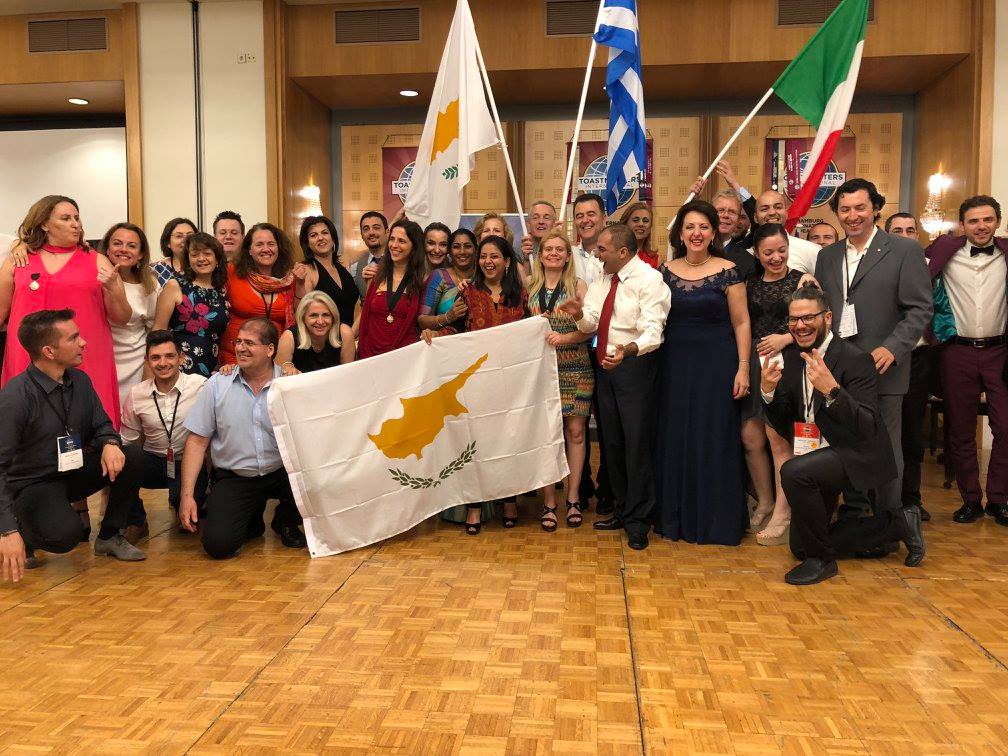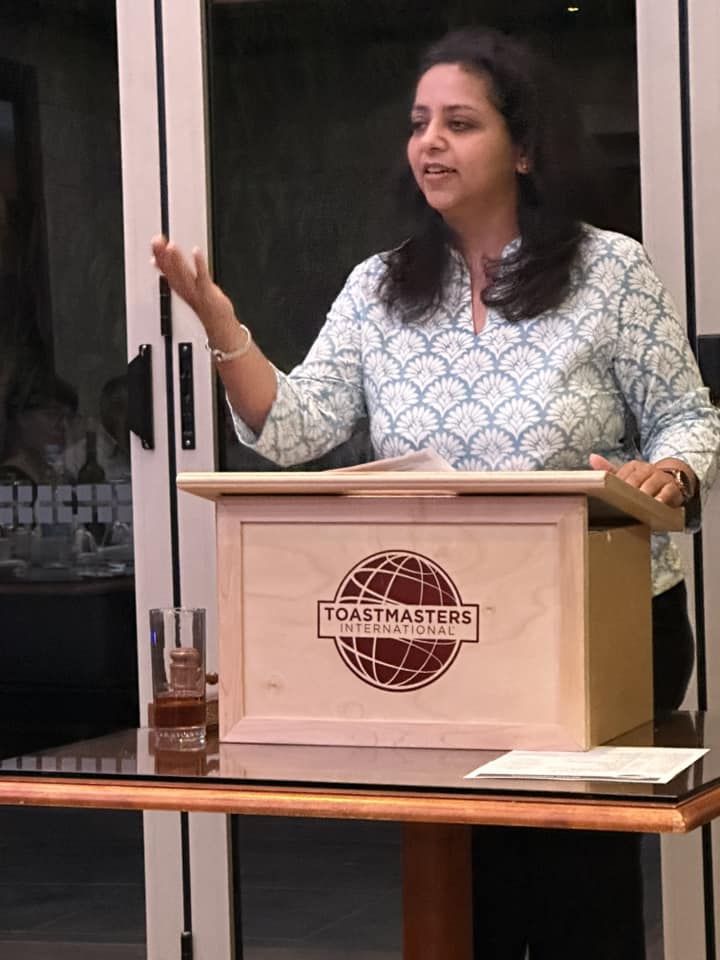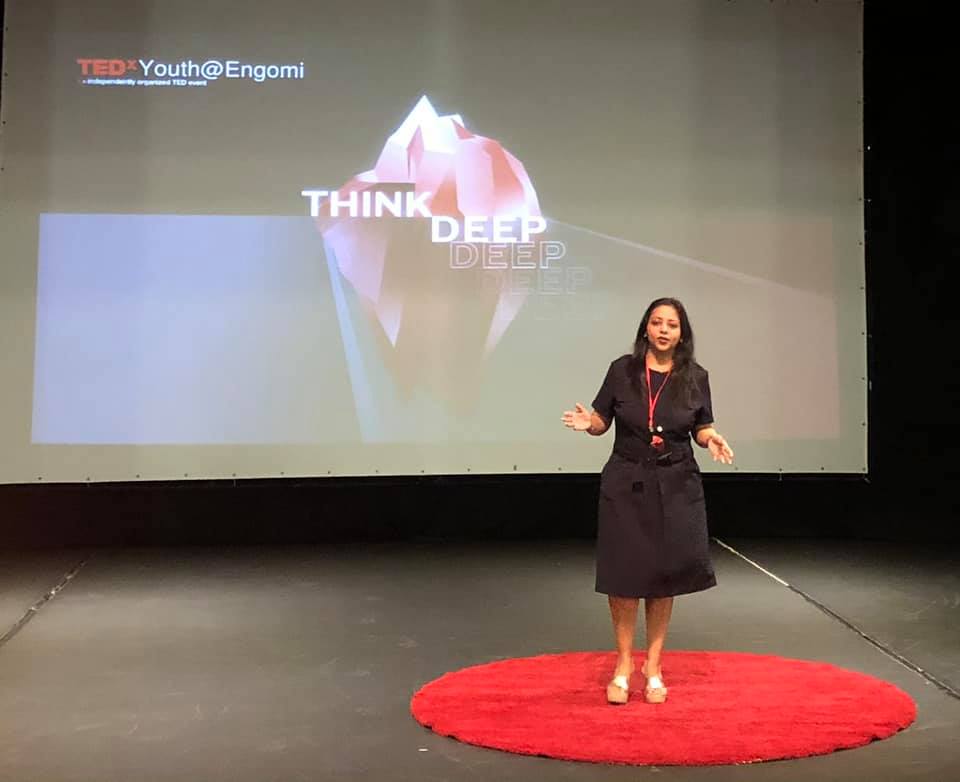Richa Tandon is a name synonymous with innovation in the realm of soft skills training.
Skill Boosters caters to the diverse needs of children by integrating components like emotional intelligence and a growth mindset into each programme.
With an eclectic background spanning interior design to retail management, she has carved a niche as a charismatic coach and speaker. From guiding TEDx hopefuls in Cyprus to shaping future leaders at Toastmasters International, Richa’s approach to communication and leadership is both refreshing and profound.
Her commitment to transforming hesitancy into eloquence among her protégés has not only won her accolades but also the respect of those looking to find their voice in a cluttered world.
What inspired you to start your journey as a soft skills trainer?
My journey as a soft skills trainer began through a blend of personal experiences and professional aspirations. Early in my career, I recognised a significant gap in how people communicated their ideas and visions within teams. To address this, I initiated workshops focused on communication and team building.
The profound impact these workshops had on participants inspired me to devote more time to developing these essential skills more broadly. With my background in interior design and a master’s in retail management, I’ve always been keenly aware of the nuances in human interactions and how the three C’s – communication, critical thinking, and creativity – can simplify these complexities.
Can you describe your experience as a TEDx Speaker Coach?
Coaching speakers for TEDx has been an incredibly rewarding experience, particularly for the first TEDx Youth conference in Cyprus. I was particularly drawn to speakers with compelling personal stories at the heart of their talks, who were initially hesitant to share them.
Through the coaching process, I helped them understand that vulnerability is not a weakness but a strength. It enables a deeper connection with the audience, ensuring the message resonates not just intellectually, but emotionally as well. A personal takeaway from this experience has been the vital role of listening; we often listen to reply, whereas we need to listen to understand.

How do your management degrees in retail marketing and human resources influence your training programmes?
My academic background in retail management and human resources significantly shapes my training programmes.
From retail management, I learned about critical thinking, decision-making, and efficiency. Human resources provided insights into empathy, stress management, and the importance of feedback. Combining these lessons with communication skills allows me to create adaptable and impactful training programmes, offering participants diverse perspectives that facilitate an easier understanding of emotional intelligence and the development of a growth mindset.
What unique challenges did you face when shifting from physical to virtual training sessions in 2020?
Transitioning from physical to virtual training sessions in 2020 presented unique challenges. Adapting content for online delivery was crucial; the dynamic of physical interaction differs vastly from virtual environments. We had to move from a ‘go with the flow’ approach to one with structured rules to manage the chaos of multiple participants speaking simultaneously. Engaging participants remotely involved initiating simple conversations to encourage camera use, thereby fostering greater involvement and engagement.

How has your role at Toastmasters International shaped your approach to leadership and communication training?
My role at Toastmasters International, particularly as Area Director and Assistant Division Director, has profoundly shaped my approach to leadership and communication training. It taught me the value of empathy and collaboration, highlighting our unique yet similar natures.
These experiences influenced my workshops deeply, integrating Toastmasters’ ethos that ‘We learn best when we are having fun’ into all my activities.
What are some common limiting beliefs you encounter among female leaders in India, and how do you address them?
In my experience, common limiting beliefs among female leaders in India include hesitations around asking for a raise or feeling guilty about taking maternity leave.
These beliefs stem from deeper issues of self-worth. Women often fear they are not good enough or haven’t achieved enough to justify their demands.
Maternity leave, similarly, is often viewed not as a right but as a potential liability to the organisation. To combat these beliefs, I encourage maintaining a journal detailing significant achievements, which can be referenced when negotiating for a raise or justifying deserved leave.
How do you tailor your workshops for female-led clubs and nonprofit organisations?
I firmly believe that a ‘one size fits all’ approach is not effective in creating impactful workshops. Therefore, I typically start by distributing a preliminary survey to understand the group’s specific needs and dynamics.
This approach is particularly beneficial for smaller groups or can be directed towards the leadership in larger organisations to ensure that the workshop’s content is highly tailored. A notable success was a workshop focused on ‘Avoiding Burnout When Working from Home,’ where participants learned to set clear boundaries and establish dedicated workspaces to maintain a healthy work-life balance.
What future initiatives are you planning in Cyprus to expand your work with female leaders?
While there are no specific plans for female leadership initiatives in Cyprus until September, I am preparing for upcoming workshops with university students on topics like ‘On the Spot Speaking’ and ‘Communicating Feedback’.
Additionally, in August, I will be collaborating with the Divas Club in India to conduct a session on stress management, which promises to be quite enriching.

What key elements do you focus on when developing leadership programmes for teenagers at The English School?
When developing leadership programmes for teenagers, I focus on enhancing communication skills to help them overcome shyness and hesitations in public speaking.
We work on structuring their thoughts clearly and confidently presenting in front of groups. We also foster an entrepreneurial mindset by introducing them to concepts like ‘Solopreneur’ and ‘Social Entrepreneurship’ and providing basic insights into ‘Design Thinking Techniques’.
How does your programme, Skill Boosters, cater to the different needs of children aged 10 to 18?
Skill Boosters caters to the diverse needs of children by integrating components like emotional intelligence and a growth mindset into each programme.
These elements are crucial for developing leadership skills as they prepare teenagers to handle competitive environments and setbacks positively. Our year-round trainings offer continuous skill development, while our summer camps provide introductory experiences that spark interest and lay the groundwork for future learning.
What outcomes have you observed from the training programmes with teenagers in Cyprus?
The training programmes have significantly helped students overcome stage fright and improve their public speaking skills.
They’ve learned to quickly organise their thoughts in any setting, which is especially beneficial during university interviews and presentations.
The recurring requests to continue these programmes in schools are a testament to their effectiveness and the value they bring to the students.
What is your vision for the future of leadership training?
The future of leadership training is likely to incorporate advanced technologies and personalised approaches, with a strong emphasis on holistic development.
My long-term goal is to create micro-learning modules, possibly in video format, which allow for bite-sized, focused learning. This approach will enable more flexible engagement and encourage initial steps towards personal development.
How do you measure the success of your training initiatives?
The success of my training initiatives is often gauged by referrals; if people come to me because someone recommended my services, it indicates the effectiveness of my work.
Additionally, I continually adjust my approach based on feedback. For example, I once believed that including games in workshops for adults might not be suitable, but positive feedback from a trial session proved otherwise, helping me to overcome my own limiting beliefs.
Can you share a memorable success story from your career as a trainer?
A particularly memorable success was when a female leader, previously hesitant about taking on client-facing roles, received a promotion after gaining confidence through our training.
This experience not only affirmed the impact of my work but also contributed to my personal growth as a communicator and trainer, embodying the principle that ‘in teaching, we learn and in learning, we teach.
What advice would you give to someone starting their career in leadership and communication training?
For those starting a career in leadership and communication training, I recommend focusing on developing key skills such as listening, observing, understanding, and improving.
It’s also crucial to embrace continuous learning and adaptation to stay relevant and effective in this evolving field.
How can technology further empower women in the workplace?
Technology can significantly empower women in several key ways.
First, it offers the flexibility of remote working, which can help balance personal and professional life. Secondly, there are vast entrepreneurship opportunities through digital marketing and online business tools, allowing women to launch and scale businesses from anywhere.
Lastly, technology grants access to a wealth of information and resources, enhancing learning and professional growth.
What emerging technologies do you see playing a crucial role in future leadership training?
Social learning platforms are emerging as game-changers in leadership training. These platforms can be finely tuned to meet the specific requirements and cultural nuances of diverse groups, making training more relevant and impactful.
In what ways can virtual reality or AI be incorporated into your training programmes?
The pace of technology is incredible, and with it, virtual reality and AI offer fantastic opportunities for training. We can use these technologies to create realistic simulations of boardroom discussions or client presentations, providing a safe space to practice and hone communication and presentation skills. I’m particularly excited to be at the user end of these developments and integrate them into my programmes.
What strategies do you recommend for women to enhance their presence in tech-dominated industries?
To enhance their presence in tech-dominated fields, I recommend that women focus on continuous learning to keep up with technological advancements. Networking with other women in the industry is crucial, as it can open doors and provide support. Additionally, actively participating in tech conferences – not just as attendees but as speakers – can significantly raise their profile and influence.
How do you envision the role of women leaders evolving over the next decade?
In the next decade, I expect to see women leaders more deeply involved in decision-making and creating more inclusive workplaces. They will likely play a dominant role in mentoring the next generation, which will be crucial for reshaping leadership dynamics across various industries. This increased involvement will pave the way for a more balanced and diverse corporate landscape.







Click here to change your cookie preferences